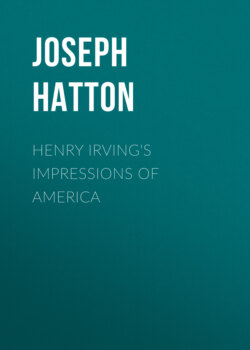Читать книгу Henry Irving's Impressions of America - Joseph Hatton - Страница 23
На сайте Литреса книга снята с продажи.
IV.
ОглавлениеTable of Contents
It is customary in American theatres for the orchestra to play the audience out as well as in.
“We will dispense with that,” said Irving to his conductor, Mr. Ball.
“It is a general habit here,” remarked the Star manager.
“Yes, I understand so,” Irving replied; “but it seems to me a difficult matter to select the music appropriately to the piece. What sort of music do you usually play?”
“A march.”
“Ah, well, you see our plays are so different, that a march which would do one night would be entirely out of place the next. Have you the score of ‘The Dead March in Saul’?”
“No,” was the conductor’s reply.
“Well, then, I think we will finish as we do in London—with the fall of the curtain. If we make a failure on Monday night, the most appropriate thing you could play would be ‘The Dead March.’ As you have no score of it we will do without the exit music.”
“And who knows,” said Irving, as we walked back to the hotel, “whether we shall have a success or not? The wild manner in which the speculators in tickets are going on is enough to ruin anything.[5] They have bought up every good seat in the house, I am told, and will only part with them at almost prohibitive prices. The play-goers may resent their operations and keep away; if they pay ten and twenty dollars for a seat, instead of two and a half or three, they cannot be expected to come to the house in a contented frame of mind. The more money they have been plundered of, the more exacting they will be in regard to the actors; it is only natural they should. Then we have no pit proper, and the lowest admission price to the gallery is a dollar. I would have preferred to play to Lyceum prices; but in that case they say I should only have been putting so much more into the pockets of the speculators. These operators in tickets are protected by the law; managers are obliged to sell to them, and the dealers have a right to hawk them on the pavement at the entrance of the theatres.”
“This is a State or city law, only applying to New York. I don’t think it exists anywhere else in the Union. It certainly does not at Philadelphia and Boston.”
“It is an outrage on the public,” he replied. “Legitimate agencies for the convenience of the public, with a profit of ten or twenty per cent. to the vendor, is one thing; but exacting from the public five and ten dollars for a two-and-a-half-dollar seat is another. After all, a community, however rich, have only a certain amount of money to spend on amusements. Therefore the special attractions and the speculators get the lion’s share, and the general or regular amusements of the place have to be content with short commons.”
“If the ‘Sun’ reporter could hear you he would congratulate himself on having called you ‘a business-like Hamlet.’ ”
